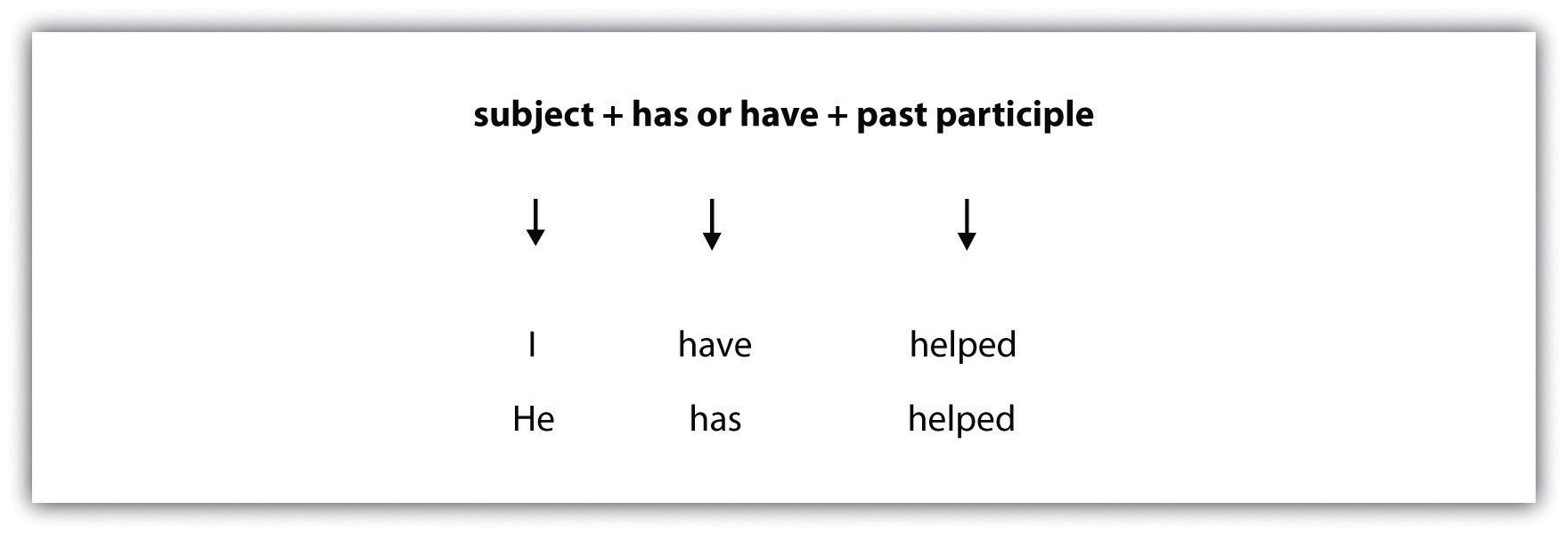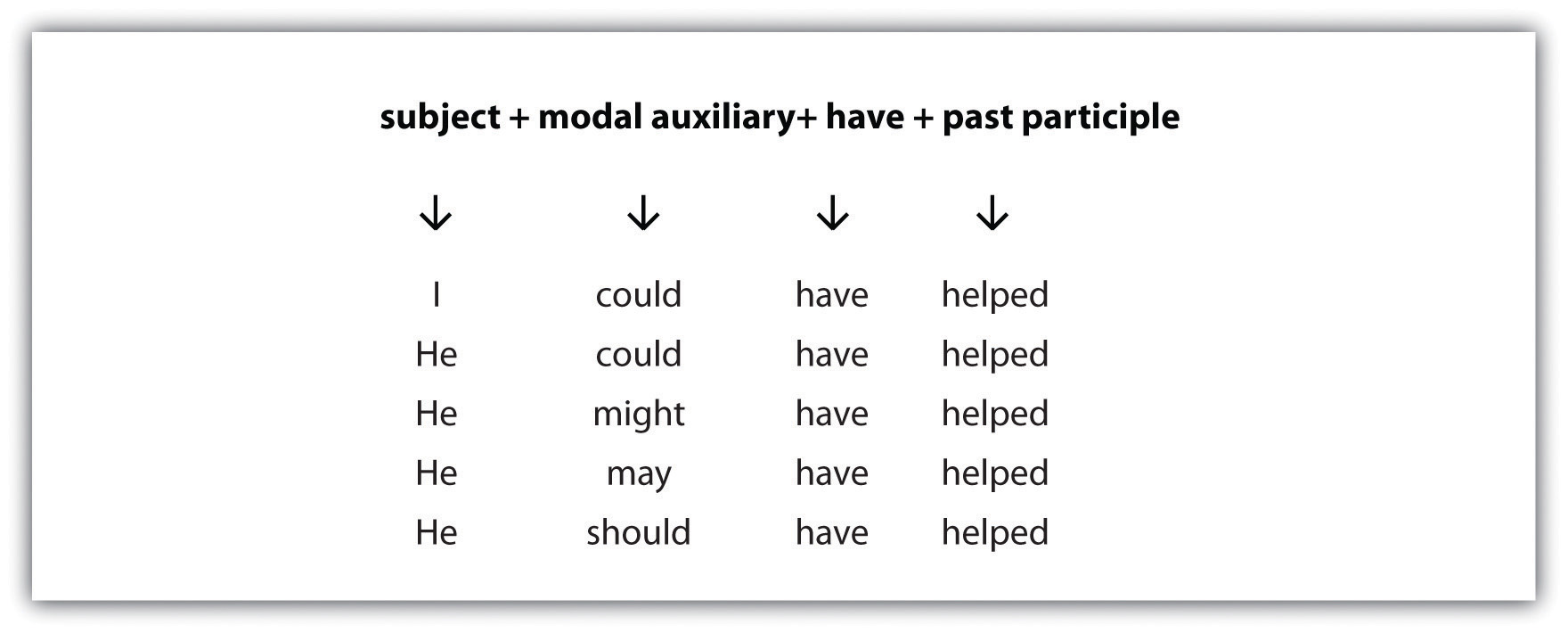12.7: Modal Auxiliaries
- Page ID
- 20713
We all need to express our moods and emotions, both in writing and in our everyday life. We do this by using modal auxiliaries to verbs.
Modal Auxiliaries
Modal auxiliaries are a type of helping verb that is used only with a main verb to help express the verb's mood.
The following is the basic formula for using a modal auxiliary:
| Subject | + | modal auxiliary | + | main verb |
| James | may | call |
There are ten main modal auxiliaries in English, which are shown in Table 12.7.
| Modal Auxiliary | Use | Modal Auxiliary + Main Verb |
|---|---|---|
| can | Expresses an ability or possibility | I can lift this forty-pound box. (ability) |
| We can embrace green sources of energy. (possibility) | ||
| could | Expresses an ability in the past; a present possibility; a past or future permission | I could beat you at chess when we were kids. (past ability) |
| We could bake a pie! (present possibility) | ||
| Could we pick some flowers from the garden? (future permission) | ||
| may | Expresses uncertain future action; permission; ask a yes-no question | I may attend the concert. (uncertain future action) |
| You may begin the exam. (permission) | ||
| May I attend the concert? (yes-no questions) | ||
| might | Expresses uncertain future action | I might attend the concert (uncertain future action—same as may) |
| shall | Expresses intended future action | I shall go to the opera. (intended future action) |
| should | Expresses obligation; ask if an obligation exists | I should mail my RSVP. (obligation, same as ought to) |
| Should I call my mother? (asking if an obligation exists) | ||
| will | Expresses intended future action; ask a favor; ask for information | I will get an A in this class. (intended future action) |
| Will you buy me some chocolate? (favor) | ||
| Will you be finished soon? (information) | ||
| would | States a preference; request a choice politely; explain an action; introduce habitual past actions | I would like the steak, please. (preference) |
| Would you like to have breakfast in bed? (request a choice politely) | ||
| I would go with you if I didn’t have to babysit tonight. (explain an action) | ||
| He would write to me every week when we were dating. (habitual past action) | ||
| must | Expresses obligation | We must be on time for class. |
| ought to | Expresses obligation | I ought to mail my RSVP. (obligation, same as may) |
Use the following format to form a yes-no (closed) question with a modal auxiliary:
| Modal auxiliary | + | subject | + | main verb |
| Should | I | drive? |
Be aware of these four common errors when using modal auxiliaries:
- Using an infinitive instead of a base verb after a modal
Incorrect: I can to move this heavy table.
Correct: I can move this heavy table.
- Using a gerund instead of an infinitive or a base verb after a modal
Incorrect: I could moving to the United States.
Correct: I could move to the United States.
- Using two modals in a row
Incorrect: I should must renew my passport.
Correct: I must renew my passport.
Correct: I should renew my passport.
- Leaving out a modal
Incorrect: I renew my passport.
Correct: I must renew my passport.
Exercise 1
Edit the following short paragraph by correcting the common modal auxiliary errors.
I may to go to France on vacation next summer. I shall might visit the Palace of Versailles. I would to drive around the countryside. I could imagining myself living there; however, I will not move to France because my family should miss me very much.
Modals and Present Perfect Verbs
In the previous section, we defined present perfect verb tense as describing a continuing situation or something that has just happened.


- Incorrect: Jamie would had attended the party, but he was sick.
Correct: Jamie would have attended the party, but he was sick.
- Incorrect: Jamie would attended the party, but he was sick.
Correct: Jamie would have attended the party, but he was sick.
Exercise 2
On a separate sheet of paper, complete the following sentences by changing the given verb form to a modal auxiliary in present perfect tense.
- The man ________ (laugh).
- The frogs ________ (croak).
- My writing teacher ________ (smile).
- The audience ________ (cheer) all night.
- My best friend ________ (giggled).
If you would like a more in-depth view of modal verbs, watch the following video:
Contributors and Attributions
CC LICENSED CONTENT, SHARED PREVIOUSLY:
- Adapted from College ESL Writers: Applied Grammar and Composing Strategies for Success. Authored by: Barbara Hall and Elizabeth Wallace. Provided by: GALILEO Open Learning Materials. License: CC BY-NC-SA (3.0): Attribution.
ALL RIGHTS RESERVED CONTENT
- Anglo-Link: Modal Verbs -- English Grammar and Conversation Lession (All Modals). Authored by: Anglo-Link. License: ALL RIGHTS RESERVED. License terms: Standard YouTube License.


